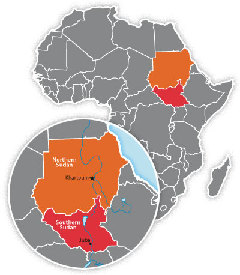The Sudan Referendum
Posted 9 Jan 2011 by Walaa Idris

This is a historic week for Africa and in particular the Sudan; it’s the week when the people of Southern Sudan hold their long awaited promised referendum on whether to split the country into two nations. The Sudan one of the largest, most resourceful countries in the continent of Africa – once dubbed the Food Basket of the World – measures almost 1,000,000 square miles but was plagued for years with drought, famine and half a century of on – off civil wars that tore it apart and stifled its growth and development.
To the surprise of the West the central government of Khartoum is holding – as part of the peace agreement signed in 2005 – a referendum on the future of creating two neighbouring nations. By the end of which, if 60% voted to separate, then the country will be split into North and South thus creating the 54th state of Africa.
The North which is predominately Arab and Muslim is also a land full of richness agriculturally, it holds plenty of untapped Oil reserves, Natural Gas, Minerals, Marine Life and an existing infrastructure with the White Nile, the Blue Nile and The Nile rivers running at the heart of it, plus of course the Red Sea on the east.
The South although land locked is equally full of natural resources and a huge reservoir of Oil and minerals, sweet water fishery and a fantastic wild life – on paper both countries are paradises and possess the foundation needed to create the best and richest possible two nations in the continent. But for over fifty years the on-off wars had took the focus and resources from developing and building and put it into fighting. Now that, that is set to end let’s hope the two countries and their people put their turbulent past behind them and build the bright future they both longed for and deserve.
The international community beside monitoring polling, counting and making sure that both are conducted smoothly and without any fraud or conflict, can also encourage the 2,000,000 Southerners who currently live in the North and are somewhat reluctant to go South to move to their new home, work in building and developing it – because this historic opportunity can only be complete when those in the know use their talents, pass their education and share their knowledge with those who need it the most.
Commenting is closed for this article.



 London Bus Route 11
London Bus Route 11